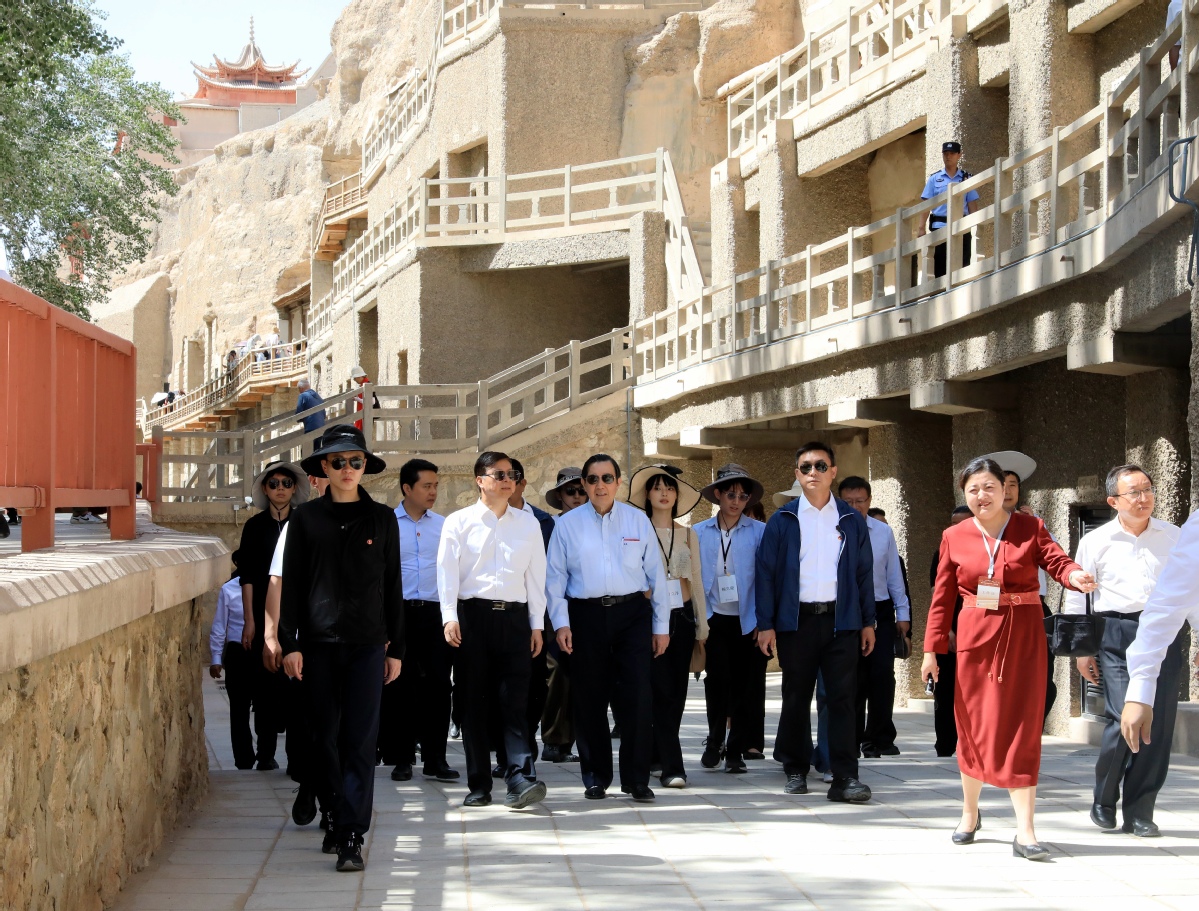Former KMT chairman speaks at Gansu seminar to promote shared heritage

Chinese culture remains the strongest and most unbreakable bond across the Taiwan Strait, and both sides share the responsibility of preserving this cultural heritage, former Chinese Kuomintang chairman Ma Ying-jeou said on Thursday at a cross-Strait seminar on Chinese culture.
"Chinese culture is the DNA of the Taiwan people," Ma said. "Any attempt to carry out cultural cleansing in Taiwan is bound to fail."
The seminar, held on Thursday afternoon at the Dunhuang Academy near the Mogao Caves in Gansu province, brought together officials, students and cultural scholars to discuss efforts to promote shared Chinese heritage. Ma attended the event alongside Song Tao, head of both the Taiwan Work Office of the Communist Party of China Central Committee and the Taiwan Affairs Office of the State Council, and Hu Changsheng, Party secretary of Gansu.
READ MORE: Ceremonies honor Fu Xi on both sides of Taiwan Strait
In his remarks, Ma said Chinese civilization continues to provide wisdom and guidance through its inclusiveness, creativity and vitality, particularly in a rapidly changing world. He cited the artistic and religious integration seen in the Mogao Caves as evidence of Chinese culture's brilliance.
"It's not just about tracing the historical roots of our culture," he said. "It's also about seeking new ideas and building consensus through dialogue."
Song emphasized that cultural exchange is a key part of peaceful and integrated cross-Strait development. He called on Taiwan compatriots to recognize the spiritual strength of Chinese culture, overcome the restrictions imposed by Taiwan's Democratic Progressive Party authorities and participate in cross-Strait engagement.
The seminar drew around 180 attendees, including students from both sides of the Taiwan Strait.
One student representative from Taiwan described the visit to Gansu as a "spiritual homecoming".
"No matter where we were born, our cultural roots have never been severed, and they cannot be erased or blocked by anyone," she said.
"Although I speak with a Taiwan accent and may have different living habits, when I stand by the Yellow River, in front of the Fuxi Temple or inside the Mogao Caves, I feel no distance between us. Our culture has already crossed the Strait and deeply connected us."
Earlier that day, Ma and the student delegation visited the Mogao Caves, a UNESCO World Heritage Site known for its murals and painted sculptures that span more than 1,000 years. The site includes 492 grottoes that trace the development of Buddhist art.
A student in the delegation surnamed Lee said he was excited to see the caves in person and noted their significance as a hub on the ancient Silk Road, where Chinese and Western arts and religious traditions converged.
"The Mogao Caves are a vital cultural treasure for studying ancient Chinese history," he said. "I hope they will be well preserved so that more people can experience their beauty and significance."
ALSO READ: Former KMT chairman praises efforts to enhance cross-Strait ties
Su Bomin, director of the Dunhuang Academy, said nearly 20,000 tourists from Taiwan visited the Mogao Caves in the first half of this year, reflecting the growing influence of Dunhuang culture on the island.
In recent days, Ma's delegation has visited several cities in Gansu, including Tianshui, Wuwei, Zhangye, Jiayuguan, Jiuquan and Dunhuang. The 14-day visit to the Chinese mainland, which included stops in Fujian, is scheduled to conclude on Friday.
Contact the writers at lishangyi@chinadaily.com.cn


